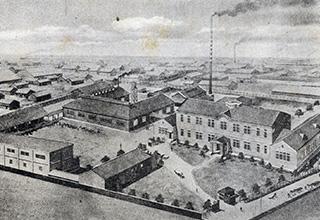Business Overview
Corporate Philosophy
Corporate Mission
Vision 2040
- proud of our culture of respect, diversity and inclusion
- in harmony with nature, enriching and bringing well-being to daily life
- full of hope and ambition, confidently taking on new challenges
- eager to keep innovating, remaining an indispensable company


History
Establishment
- Amidst the post-World War I recession, Tadaka Kainosho established Takasago on February 9, 1920.
- In July of the same year, the head office and factory were moved to Kamata where the head office is now located.
- In 1928, The production of Vanillin and Heliotropin from Safrole using ozone oxidation began.

Expansion to Taiwan
- Expanded production in the Showa period and entered Taiwan to secure raw materials such as camphor by-product oil.
- A factory is built there, and the head office is moved to Taiwan in 1938.

A fresh start after World War II
- Restarted business in Japan after World War II, focusing on production and sales of synthetic aroma ingredients.
- In 1947, Hiratsuka Factory opened.
- In 1954, the production of Menthol began and production of Musk T began in 1955.

Progress of Japan and Overseas Business
- Expanded business scale during the period of rapid economic growth, opening representative offices in Europe and the U.S. early on in 1960.
- Subsequently, the company transformed from a synthetic aroma ingredients company to a comprehensive flavors and fragrances company.

Long-term stability through technology and overseas operations
- Accelerate expansion into overseas markets while improving domestic production system.
- In Japan, construction of the Kashima Plant for flavors was completed in 1980. Then, the full-scale production of ℓ-menthol began at the Iwata Plant in 1983.
- For overseas, two joint ventures were established in China in 1987. We invested in a Spanish synthetic aroma ingredients company in 1988 (which later became a wholly owned subsidiary), and established Takasago Europe G.m.b.H. in Zülpich, Germany in 1992.

Moving toward Globalization
- Takasago’s outside director, Ryoji Noyori was awarded the Nobel Prize in Chemistry in 2001.
- Joint venture in Madagascar was established to secure and utilize natural vanilla resources amid the growing preference for natural products mainly in the flavor market in 2013.
- To establish and expand bases in the growing Asia, we expanded production capacity in Singapore in 2014 and a plant was built in in India and Indonesia in 2017 and 2019 respectively.

Business Unit・Product Introduction
Business Unit


Flavor


Fragrance


Aroma Ingredients


Fine Chemical
Our Product Usages

Our Strengths

R&D Structure
Global Network

Headquartered in Japan, the Takasago Group has research laboratories, factories, and sales offices in 28 countries. We have established a global raw material procurement system and comply with various laws and regulations. We also analyze market changes and trends in each country to provide the products that satisfy the customers.
Sales by Region




Sustainability
Sustainability Basic Policy
Based on the “Care for People, Respect the Environment” statement in our Vision 2040, the Takasago Group respects all kinds of values and aims to live in coexistence with nature. Through fair and transparent corporate activities, we will continue to address social issues and contribute to sustainability in all forms.
Progress to Date
We announced our Environmental Declaration in 2002 and have continued to address environmental issues through our business activities. In 2009, we launched the "EHS100 Plan," the Group's medium- to long-term CSR plan, and have been reporting on the targets of our activities and the evaluation of our achievements in the Environmental Report. In GP-3, we established a global sustainability promotion system, and in NGP-1, which started in 2021, we have set a goal of strengthening our sustainability promotion.

Takasago Sustainability Team and Promoting Committee
The Takasago Sustainability Team was formed in 2017 to ensure that all our activities are globally aligned with the vision and strategy and action plans are executed in a timely and appropriate manner. The team performs five key corporate functions: EHS, Human Resources, Quality Assurance, Operations, and R&D. The general manager of the Global Integration Headquarters leads the team and communicates information about key sustainability matters to the Board of Directors. Corporate officers and representatives involved in each function participate in the activities of the Sustainability Promoting Committee, which meets once every 2-3 months at Headquarters to exchange information and concerns and monitor the progress of our activities. Individual teams are responsible for communicating information about their functional areas across the globe and developing their own action plans following the corporate strategy.
Mid-Term Management Plan
New Global Plan-2【NGP-2】: Mid-Term Management Plan 2024-2026
Management Plan
Our company is advancing its business activities under Vision 2040, which was established in March 2021. To align with this Vision 2040, we have announced the new mid-term management plan, New Global Plan-2 (NGP-2), for the period from fiscal year 2024 to 2026, on March 27, 2024.
This plan was developed with consideration of the Tokyo Stock Exchange's request for management practices that are mindful of capital costs and stock prices. The board of directors has reviewed and approved the current situation analysis, improvement strategies, goals and plan period, as well as specific initiatives.
For details on this mid-term management plan and our approach to managing capital costs and stock prices, please refer to the page below.
New Global Plan-2【NGP-2】


